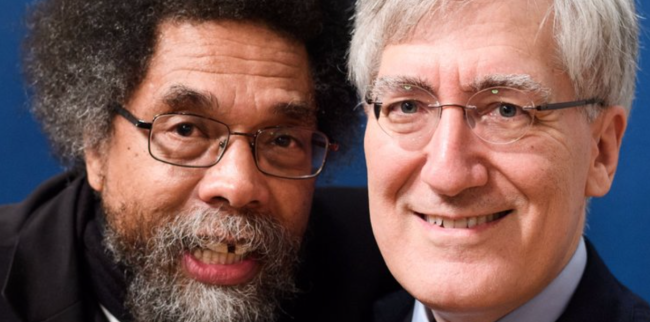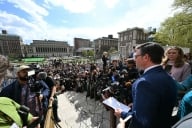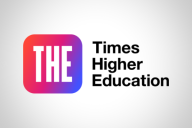You have /5 articles left.
Sign up for a free account or log in.

Cornel West, left, and Robert P. George
Stylistically and politically, Robert P. George and Cornel West don’t have much in common. George, McCormick Professor of Jurisprudence and director of the James Madison Program in American Ideals and Institutions at Princeton University, is one of the country’s most prominent conservative intellectuals. West, a professor of the practice of public philosophy and African and African-American studies at Harvard University, is a self-described “radical Democrat” who, in addition to many books, once released a spoken-word album.
So when George and West agree on something and lend their names to it, people take notice -- as they did this week, when the pair published a statement in support of “truth seeking, democracy and freedom of thought and expression.” It’s a politely worded denunciation of what George and West call “campus illiberalism,” or the brand of thinking that led to this month’s incident at Middlebury College, where students prevented an invited speaker from talking and a professor was physically attacked by some who were protesting the invitation.
“It is all too common these days for people to try to immunize from criticism opinions that happen to be dominant in their particular communities,” reads the statement. “Sometimes this is done by questioning the motives and thus stigmatizing those who dissent from prevailing opinions; or by disrupting their presentations; or by demanding that they be excluded from campus or, if they have already been invited, disinvited.”
Sometimes, it says, “students and faculty members turn their backs on speakers whose opinions they don’t like or simply walk out and refuse to listen to those whose convictions offend their values. Of course, the right to peacefully protest, including on campuses, is sacrosanct. But before exercising that right, each of us should ask: Might it not be better to listen respectfully and try to learn from a speaker with whom I disagree? Might it better serve the cause of truth seeking to engage the speaker in frank civil discussion?”
All of us “should be willing -- even eager -- to engage with anyone who is prepared to do business in the currency of truth-seeking discourse by offering reasons, marshaling evidence and making arguments,” George and West wrote. “The more important the subject under discussion, the more willing we should be to listen and engage -- especially if the person with whom we are in conversation will challenge our deeply held -- even our most cherished and identity-forming -- beliefs.”
Such “an ethos,” they conclude, “protects us against dogmatism and groupthink, both of which are toxic to the health of academic communities and to the functioning of democracies.”
George said in an interview Wednesday that signatures for the statement were flowing in at rate of several per minute, and that the names reflect all points of the ideological spectrum. “We’re gratified,” he said, adding that the statement aims to “encourage -- put the courage in -- people to stand up for themselves” and for the values of the academy.
“The goal is a heightened sense among faculty, administrators and students -- all three categories -- that they must refuse to tolerate campus illiberalism,” George said. “It’s a shared responsibility of everybody to not only refuse to participate in it but to refuse to accept it. In order for colleges and universities to fulfill their missions, there has to be an ethos, an atmosphere, an environment, in which people feel free to speak their minds -- where people are challenging each other, and thus learning.”
The immediate impetus for the statement was indeed the shouting down of Murray, author of the controversial book The Bell Curve, at Middlebury; the professor who was injured at the protest is the next signatory, after George and West. But the authors say they’ve long been concerned with a turning tide on colleges campuses that’s led to the shouting down and disinvitation of invited speakers, and other forms of what is arguably intellectual censorship. They’ve been trying to model the kind of civil dialogue they’re advocating for several years, teaching and speaking together publicly about the benefits of a liberal arts education -- including recently at the American Enterprise Institute.
Yet college illiberalism continues to grow, in their view. Just recently, for example, George said, Peter Singer, Ira W. DeCamp Professor of Bioethics at Princeton, who has argued in favor of abortion and euthanasia for severely disabled infants in some instances, was interrupted by disability rights protesters throughout an appearance via Skype at the University of Victoria in Canada.
George blamed the phenomenon on a campus culture of rightful inclusion that has been somehow “corrupted into the idea that people have the right to be free from hearing positions they disagree with.” That’s exacerbated, he said, by an emergent “consumer model” of education, in which colleges and universities competing for enrollments don’t want to offend their “customers,” even if the product -- higher education -- is supposed to be “challenging students’ deeply held convictions and helping them to lead examined lives.”
Singer announced on Twitter that he’d signed the petition. George pointed out that Mary Ann Glendon, Learned Hand Professor of Law at Harvard University and former U.S. ambassador to the Holy See, who is anti-abortion and in many ways Singer’s ideological opposite, also signed on.
Two people who seemingly have little in common, George said, are “completely on the same page” when it comes to their responsibilities as members of the academic community.
George is also active on social media. He’s been tweeting that no one's yet been held "accountable" for the protest at Middlebury, which resulted in a concussion for Allison Stanger, Russell J. Leng '60 Professor of International Politics and Economics.
Stanger said she was asked to sign the statement first and did so, willingly. “It is beautifully written and badly needed, both for college campuses and the country at large,” she said via email. “Nothing good ever comes from demonizing our brothers and sisters.”
As for accountability, George said that students who intentionally disrupt educational opportunities in educational settings should be expelled. And where such protests turn violent, he said, the cases should be turned over to local -- not campus -- police and legal authorities.
Sarah Ray, Middlebury spokesperson, said Wednesday that the college has hired an independent investigator to look into what is “a very complex incident.” She reiterated a previous statement from President Laurie L. Patton that said Middlebury is a “determining a course of action for each individual understood to be involved in some way” in the events March 2.
Right now, she said, “we are gathering information and conducting a thorough investigation. This takes time, especially since so many people are involved.”
Samantha Harris, vice president of policy research at the Foundation for Individual Rights in Education and a former student of George’s at Princeton, approved of the statement. “It's critical for people to come together from across the political spectrum and agree to listen, and agree to disagree,” she said -- especially when they're defending the right to hear views that differ from their own.
The statement's lasting impact, however, will depend on “how universities respond to incidents like the one at Middlebury,” and whether there are especially serious consequences for protesters who turn to violence. Middlebury was a “watershed moment,” Harris added, because -- in contrast to the recent mob of nonstudents who protested a planned appearance at the University of California, Berkeley, by the known provocateur Milo Yiannopoulos -- Murray, though controversial, “is a sober academic” and Middlebury is a “traditional liberal arts college."
Michael Bérubé, Edwin Erle Sparks Professor of Literature and director of the Institute for the Arts and Humanities at Pennsylvania State University in State College, once led the Modern Language Association and has written on such issues as disability (at times disagreeing, albeit civilly, with Singer, for example). He called George and West “an unlikely tennis doubles,” saying he’d just seen the statement — and that it was "totally legit."
“I’ve always believed that shouting down or disrupting speakers is a perfect way for the academic ‘left’ to advance the right's agenda,” he wrote in an email. “It plays right into the wrong hands.”
Bérubé said he’d draw the line at Yiannopoulos, “since his ‘lectures’ included vicious attacks on individual students. But his 15 minutes seem to be up, not a moment too soon. But sitting and listening to Murray or Singer? ...You might, as the statement says, even learn how to argue more effectively with people you disagree with.”









